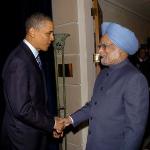Choosing Between India and Pakistan
 Pakistan's assessment of Indian intentions has always been paranoid, and if we're to "go slow" in South Asia until Pakistan calms down, we will never build the relationship with India that we need.
Pakistan's assessment of Indian intentions has always been paranoid, and if we're to "go slow" in South Asia until Pakistan calms down, we will never build the relationship with India that we need.
The New York Times leads today's story on the nuclear summit with some hard words about the Bush administration's nuclear deal with India.
Three months ago, American intelligence officials examining satellite photographs of Pakistani nuclear facilities saw the first wisps of steam from the cooling towers of a new nuclear reactor. It was one of three plants being constructed to make fuel for a second generation of nuclear arms.
The message of those photos was clear: While Pakistan struggles to make sure its weapons and nuclear labs are not vulnerable to attack by Al Qaeda, the country is getting ready to greatly expand its production of weapons-grade fuel.
The Pakistanis insist that they have no choice. A nuclear deal that India signed with the United States during the Bush administration ended a long moratorium on providing India with the fuel and technology for desperately needed nuclear power plants.
Now, as critics of the arrangement point out, the agreement frees up older facilities that India can devote to making its own new generation of weapons, escalating one arms race even as President Obama and President Dmitri A. Medvedev of Russia sign accords to shrink arsenals built during the cold war.
The authors of the piece have been listening to self-serving Pakistani sources.
Note 2 things please:
First, there is as yet no evidence that India has in fact ramped up its weapons productions.
Second, Pakistan's assessment of Indian intentions has always been paranoid, never clear-eyed, and if we're to "go slow" in South Asia until Pakistan calms down, we will never build the relationship with India that we need.
Worth reading in this regard is a fascinating report from Karachi by Jason Burke, in the current issue of Britain's Prospect magazine.
A decade ago, [Pakistan] felt like the western extension of south Asia. Now it feels increasingly like the eastern fringe of the middle east.
Key to this shift is a transformation of attitude among urbanized Pakistanis - whose modernization has taken them in distinctly anti-Western directions. Burke calls such people "Mehran man" after an inexpensive car popular with the country's middle class:
Mehran man has a satellite television (there are now 43m viewers in Pakistan), likes the occasional Bollywood movie and is not averse to a bottle of cheap whisky, though not at home. This does not stop him being socially conservative and pious. His wife will wear a headscarf or veil, as will his daughters from puberty.
Much of his worldview is close to the “single narrative”—that the Muslim world is under attack from western interests controlled by neo-Crusaders and malevolent Zionist-Jewish lobbies. Like many Pakistanis, he believes that 9/11 was probably the work of the CIA and/or Mossad. ...
Mehran man's sentiments towards India are divided. There is the attraction of the glitzy country seen in films and then there is the India as historic enemy and oppressor. Similarly, there are the freedom fighters of Kashmir or Afghanistan and there are the terrorists: the distinction is based on the identity of their victims. Kill Americans in Afghanistan or get killed by them anywhere and you are a freedom fighter, kill Pakistanis and you are a terrorist. Mehran man is incensed by the drone attacks in the northwest frontier, as much for their infringement of national sovereignty as out of solidarity with poor villagers killed by them.
Mehran man is deeply proud of his country. A new identification with the ummah, or global community of Muslims, paradoxically reinforces rather than degrades his nationalism. For him, Pakistan was founded as an Islamic state, not a state for south Asian Muslims. Mehran man is an “Islamo-nationalist.” His country possesses a nuclear bomb that, as one Lahore shopkeeper told me, even the rich Arabs haven’t built. The sentiment of self-sufficiency and nascent confidence, hardly justified given Pakistan’s dependence on external aid and internal weaknesses, is boosted by the size of the country: in a decade the population will near 200m.
Would it really make sense to sacrifice the emerging strategic partnership with India to chase such sentiments? And even if it did - is there any realistic hope that we could ever satisfy them?